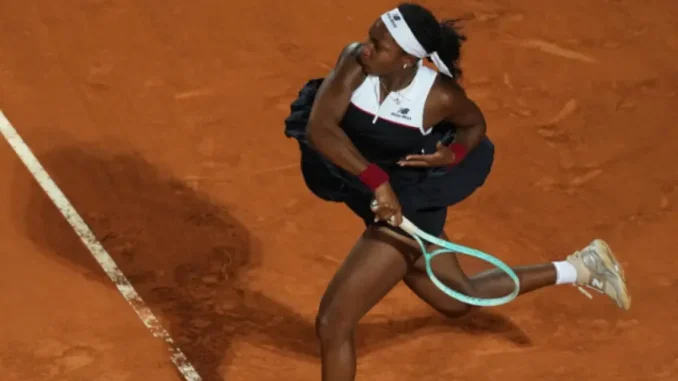
Coco Gauff, the 20-year-old American tennis prodigy, faced the press after a grueling third-round match at the 2025 Italian Open, where her performance sparked renewed discussion about her persistent double faults and unforced errors. Despite a hard-fought 6-4, 3-6, 7-6(4) victory over Moyuka Uchijima, Gauff’s staggering 21 double faults and 74 unforced errors raised eyebrows among fans and analysts. Addressing these concerns head-on, Gauff offered a candid reflection on her game, blending frustration with optimism as she navigates technical adjustments and the mental demands of professional tennis. Her response underscores the resilience that has defined her meteoric rise, even as she grapples with challenges that threaten her consistency at the sport’s highest level.
The Rome match was a microcosm of Gauff’s 2025 season—an erratic blend of brilliance and vulnerability. The world No. 3, who clinched the 2023 US Open and the 2024 WTA Finals, has struggled with her serve, amassing a tour-leading 430 double faults in 2024 alone. Against Uchijima, her 21 double faults tied a career-high, a figure that echoed her error-strewn semifinal loss to Aryna Sabalenka at the 2024 Wuhan Open. The unforced errors, particularly 74 in a single match, were equally alarming, fueled by Gauff’s aggressive approach. “The unforced errors, I had to go bigger towards the end of the match, and even in the middle, because I felt like she would dictate,” Gauff explained, highlighting her tactical choice to take risks to counter Uchijima’s control. “Then doubles, I’ve been in the practice of trying to fix things on my serve. It’s just an up-and-down process.”
Gauff’s serve has long been a double-edged sword. Her powerful first serve, which led the 2025 Australian Open with 32 aces, can dominate points, but her second serve remains a liability, with a 26% double-fault rate on second serves this season. This technical flaw, which she attributes to her left side snapping down too early, has been a focal point of her work with coaches Brad Gilbert, Jean-Christophe Faurel, and new addition Matt Daly. “I’m trying to find the balance of going big but also knowing when to slow down just to get the serve in,” Gauff said, acknowledging the ongoing tweaks that have yet to fully settle. Despite the struggles, she remains defiant, noting, “If I’m able to win matches playing kind of like D tennis, then it gives me confidence just when I’m able to mesh things together like I did earlier this season.”
The mental toll of these errors is undeniable. Gauff has described her serving issues as “emotional” and “mental,” particularly after her US Open title defense collapsed in 2024 with 19 double faults against Emma Navarro. Chris Evert, commentating on that match, remarked, “I don’t think I’ve ever seen her play so badly,” a sentiment that stung but didn’t deter Gauff. In Rome, she admitted to moments of frustration, especially in the third set against Uchijima, where she squandered a 4-0 lead. “It’s tough out there,” she said, reflecting on the match’s volatility. Yet, her ability to claw out a win, even on an off day, speaks to her competitive spirit. “I’m proud that I was able to get through today’s match,” she said, echoing her post-match comments after a scrappy Australian Open win over Marta Kostyuk, where she made 51 unforced errors but still prevailed.
Looking ahead, Gauff faces a daunting third-round clash with Maria Sakkari, a two-time Indian Wells finalist known for her physicality and desert-court prowess. “Every time I play her, it’s a tough match. She’s a very athletic player. Big on both sides. Same with the serve,” Gauff said, recognizing the need to sharpen her game. Sakkari’s aggressive style will test Gauff’s ability to reduce errors, particularly after spraying six double faults in the final game against Uchijima. “I guess my keys will just be to focus on my end of the court and accept that she’s going to hit some great shots,” Gauff added, emphasizing mental clarity over perfection.
Gauff’s candor about her struggles resonates with fans who see her as a work in progress, not a finished product. Her 2024 season, capped by titles in Beijing and the WTA Finals, proved she can overcome her weaknesses, but the double faults and errors remain a hurdle to reclaiming the world No. 1 spot. Rick Macci, Serena Williams’ former coach, suggested offseason experiments with her serve, while Gauff herself aims for a realistic target of two double faults per set. “Obviously you want to go with no double faults, but because I go so big on the first serve, it’s a risk you are willing to take,” she said after the Olympics. As she prepares for the French Open, where she reached the 2022 final, Gauff’s journey is one of balancing ambition with patience, trusting that her solutions will soon outshine her setbacks.
Leave a Reply